EXPLORING SUBCONSCIOUS ANCHORS
- Derek Hagen

- Apr 11, 2024
- 4 min read
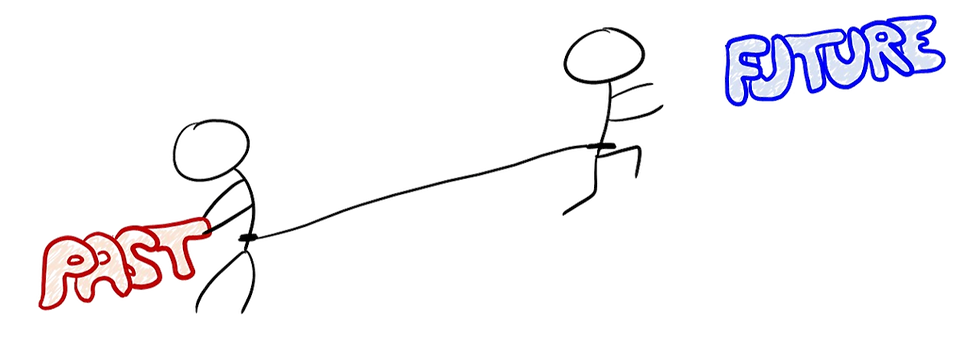
❝If nothing can be done, we'll make the best of what's around.❞ -Dave Matthews Band, "The Best of What's Around"
Joe is out for a run on a warm, sunny morning in June. He loves running and can't imagine his life without running several times per week.
Later that week his doctor tells him that there's a problem with his knees and that continuing to run is too much of a risk. He can walk, and if he likes, he can take up speedwalking. There are other forms of exercise available to him, too, like biking or swimming.
It doesn't matter. Joe is devastated. He eventually tries speedwalking, but speedwalking isn't running. He hates it. He hates not being able to run.
He's anchored himself to his old life, even though his situation has changed. He fails to accept what has happened and, as a result, isn't fulfilling himself as best he can.
Perhaps you've experienced something like this. It's not always physical limitations. Sometimes is an investment loss or losing a job. It might be the loss of a relationship.
Whatever it is, these situations act like subconscious anchors that keep us from living meaningful lives.
LIFE IS A HIGHWAY
Imagine your life like being on a freeway. Life is pretty easy on the freeway. All traffic goes one way. There are no intersections. You can use cruise control. There is no cross traffic.
Life on the highway kind of looks like this.

It's simple.
With life, we get used to our surroundings. Psychologists call this hedonic adaptation.
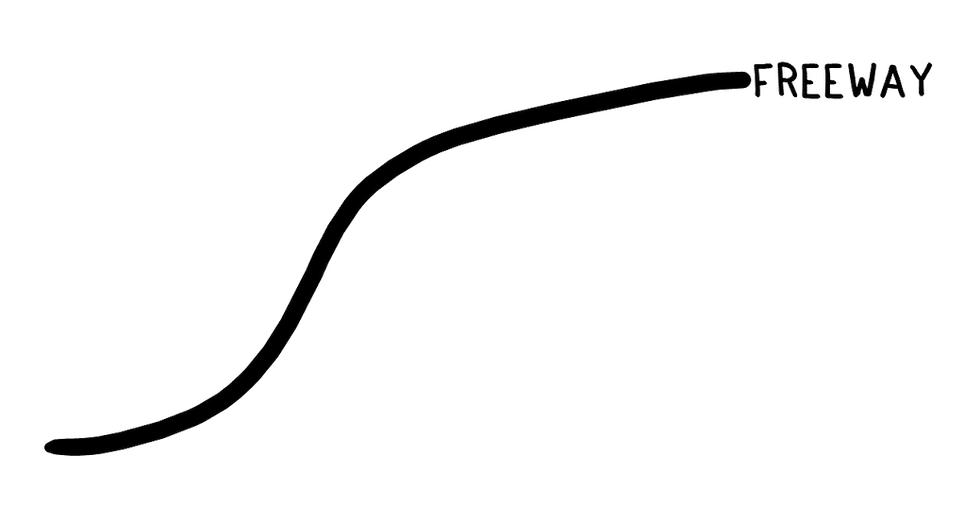
It's comfortable to know how things work, what the rules are, and have a routine.
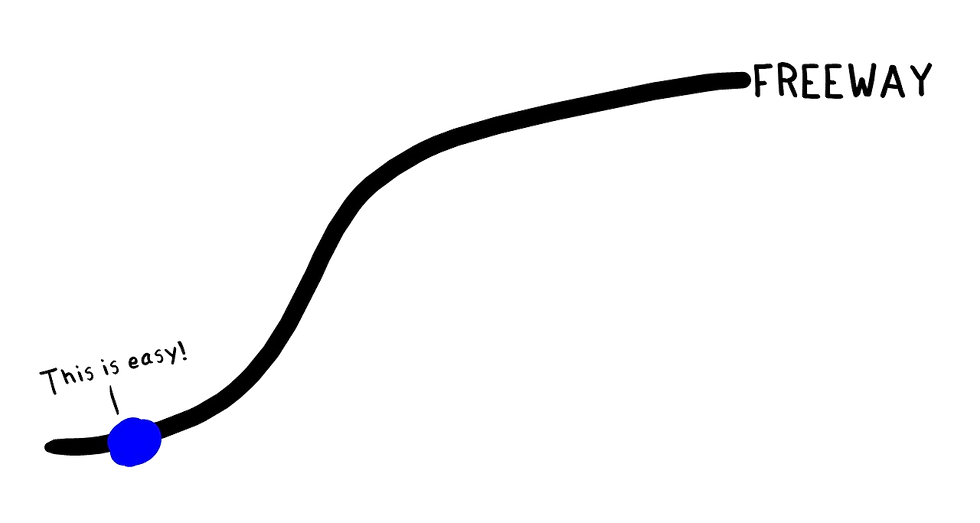
LEAVING THE HIGHWAY
As we're driving along the freeway, enjoying our comfortable lifestyle, sometimes something happens that gets us off the comfortable highway. It could be the loss of a job, investment mistake, physical injury, loss of an important person, or any other disruptor.
Disruptions interrupt normalcy for us.
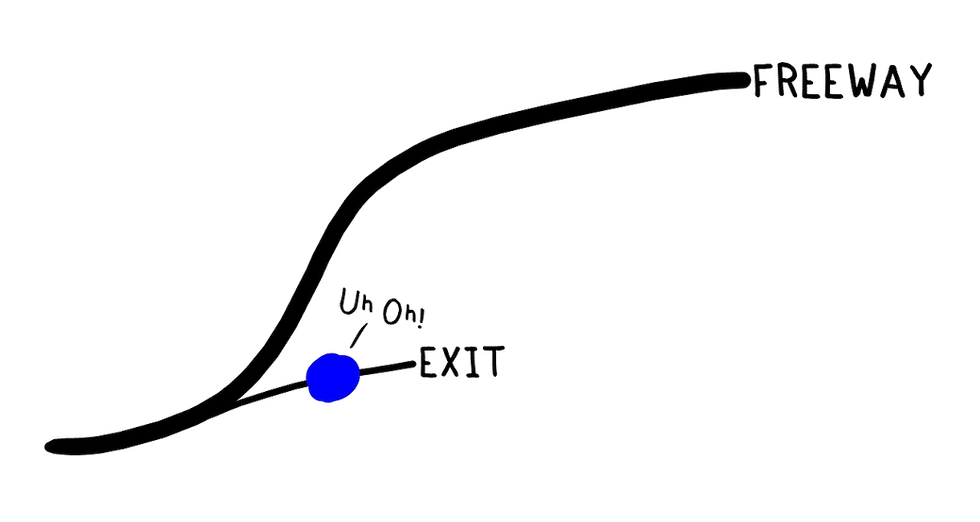
Driving on the freeway is quite different from driving in the city. The rules are different. There is traffic going both ways. There are intersections and traffic lights. Sometimes there are one-ways.
When something disrupts our lives, the rules change. That's uncomfortable. We've become attached to the freeway. We have a mental anchor that forces us to resist moving forward.
With all the discomfort, we find ourselves lost. We liked driving on the freeway. We knew the rules there. Every part of us wants to get back there.
But it's not always easy to get back on the freeway. We sometimes have to navigate a complicated city grid to get there. Sometimes we can't get back on the freeway and have to get used to driving in the city.
When life throws us curve balls, it's tempting to focus all our energy on getting back to where we were, even though sometimes we can never get back to where we were.
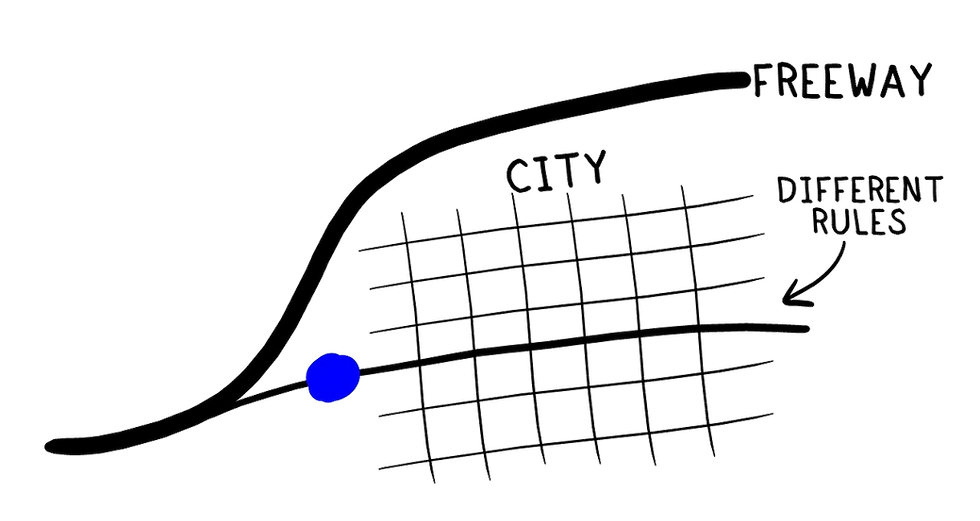
WHAT IS NOT VS. WHAT IS
After facing setbacks and obstacles, like having to leave the freeway in our example, it's easy to focus on what ISN'T.
"I'm not able to live my old life."
"I can't do what I used to do."
"I'm not able to go to work."
Focusing on how things aren't instead of how things are is a key sign of nonacceptance.
Imagine you spilled some milk. Focusing on what isn't is to focus on a full glass of milk. Why did the milk have to spill? I liked things better when there was milk in the glass. I don't like having milk on the table and floor.
Note that these kinds of statements prevent you from actually doing something about the spilled milk that needs your attention.
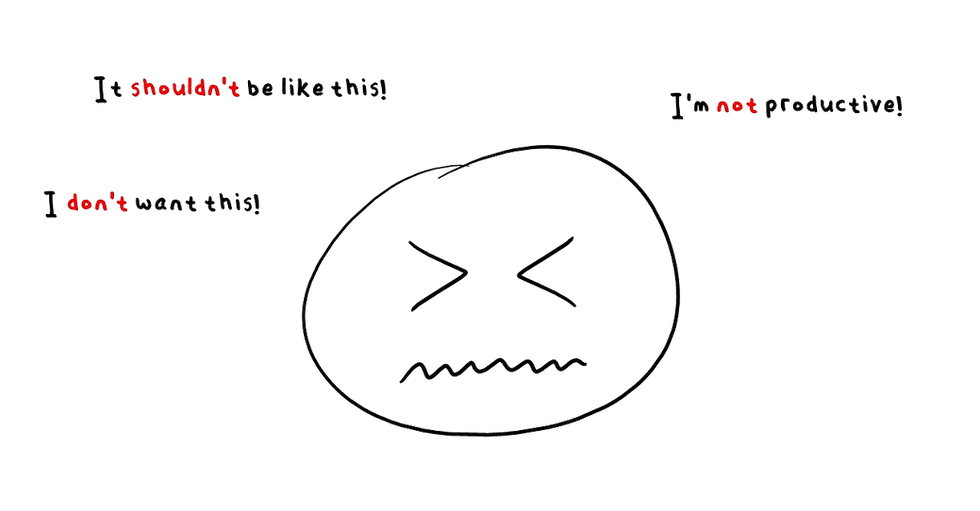
In contrast, focusing on what is there, is acceptance. It's the recognition that right now, this is how it is. It changes the mindset from "I wish I was still on the freeway" to "What's possible now?"
Accepting what has happened is akin to seeing that the milk spilled. Once you accept what has happened, you can figure out your best move going forward. In this case, cleaning up the milk. You can take it further, too. Once the immediate problem has been taken care of - the milk is cleaned up - you can learn from what happened. You can make it less likely that milk will spill in the future.
Once you're off the freeway, acceptance is to ask, "What's my best move now that I'm off the freeway?
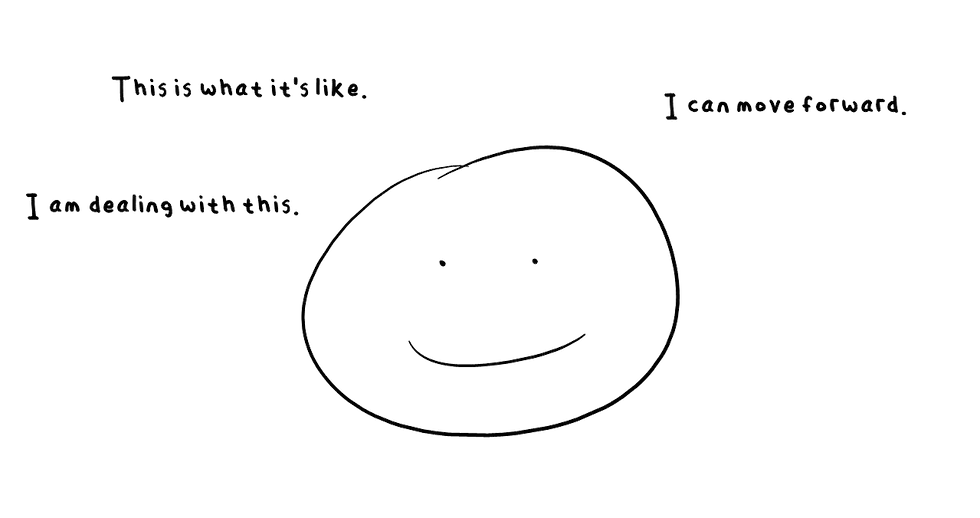
LETTING GO OF YOUR ANCHORS
Being attached to our old life - wanting to stay on the freeway - is like anchoring yourself to the past. It weighs you down and limits your options going forward.
The first step toward acceptance is recognizing that the past can't be changed. Irvine Yalom has said, "Sooner or later, you have to give up hope for a better past."
Once something has already happened, you can't do anything to prevent that thing from happening. Understand that, and you are on the path to acceptance.
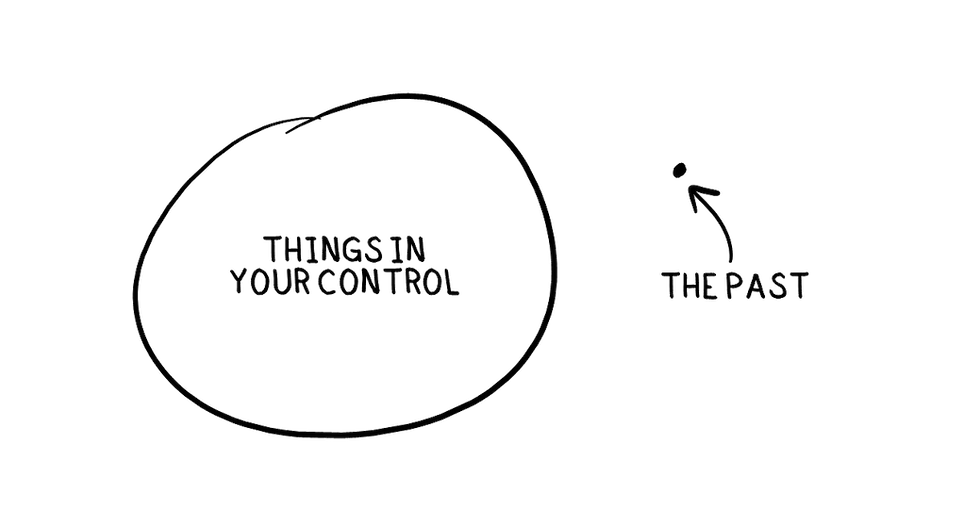
Let me close the door on a potential misunderstanding. Some people will hear me talk about acceptance and think that it refers to being a pushover or a doormat that others walk all over.
This is fundamentally untrue.
You don't have to like the fact that the milk spilled in order to accept that it happened. Acceptance has nothing to do with liking or not liking.
You also don't have to surrender and let everything happen to you or not do anything to remedy the situation. Once the milk spills, acceptance means asking yourself, "Now that this happened, what's my best course of action?"
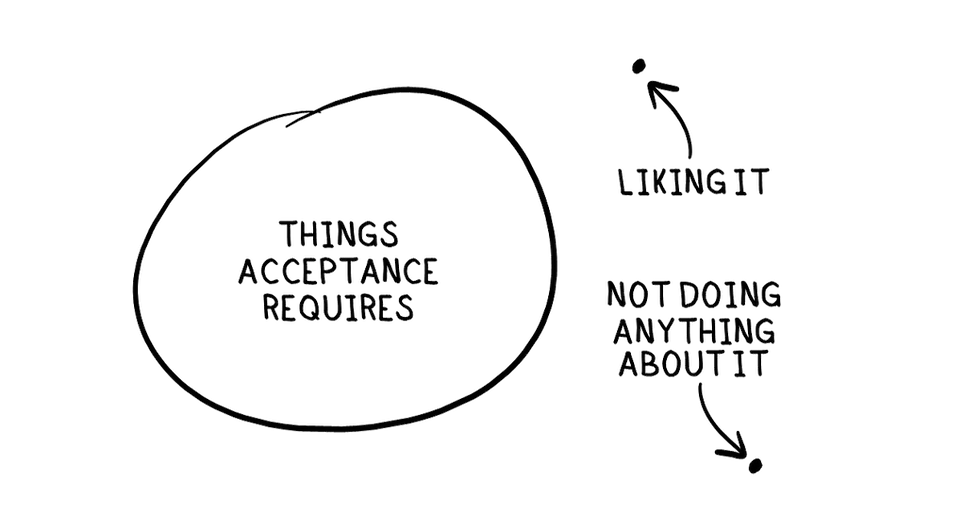
It's helpful to occasionally see if there are mental anchors that are keeping us from moving forward. Accepting your life as it is will help you drop the anchor and move forward from where you are.
You get one life; live intentionally.
If you know someone else who would benefit from reading this, please share it with them. Spread the word, if you think there's a word to spread.
To share via text, social media, or email, simply copy and paste the following link:

Subscribe to Meaningful Money
Thanks for reading. If you found value in this article, consider subscribing. Each week I send out a new post with personal stories and simple drawings. It's free, and there's no spam.
REFERENCES AND INFLUENCES
Becker, Joshua: Things That Matter Ben-Shahar, Tal: Happier, No Matter What Boniwell, Ilona: Positive Psychology in a Nutshell Burkeman, Oliver: The Antidote Dalai Lama & Howard Cutler: The Art of Happiness Denborough, David: Retelling the Stories of Our Lives Emmons, Robert: THANKS! Gillihan, Seth: Mindful Cognitive Behavioral Therapy
Hagen, Derek: Money’s Purpose in Your Life Haidt, Jonathan: The Happiness Hypothesis Hall, Kindra: Choose Your Story, Change Your Life
Hanh, Thich Nhat: No Mud, No Lotus Hanh, Thich Nhat: You Are Here Hanson, Rick: Hardwiring Happiness Hanson, Rick & Forrest Hanson: Resilient Hanson, Rick & Richard Mendius: Buddha’s Brain Harris, Dan: 10% Happier Harris, Sam: Waking Up Hefferon, Kate & Ilona Boniwell: Positive Psychology Ivtzan, Itai, Tim Lomas, Kate Hefferon & Piers Worth: Second Wave Positive Psychology Kabat-Zinn, Jon: Wherever You Go, There You Are Kinder, George: Transforming Suffering into Wisdom Manson, Mark: The Subtle Art of Not Giving a Fuck
McAdams, Dan: The Stories We Live By Reivich, Karen & Andrew Shatte: The Resilience Factor Wallace, David Foster: This is Water Ware, Bronnie: The Top Five Regrets of the Dying Wilson, Timothy: Redirect














